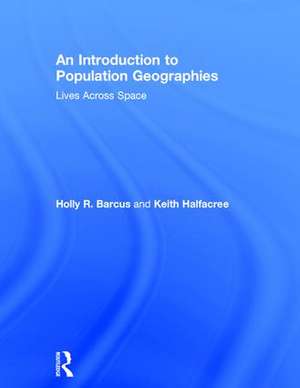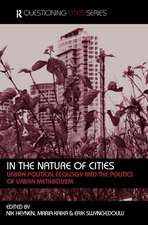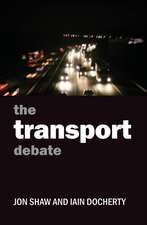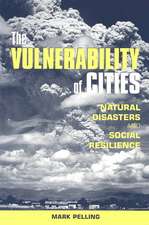An Introduction to Population Geographies: Lives Across Space
Autor Holly R. Barcus, Keith Halfacreeen Limba Engleză Hardback – 29 aug 2017
Written in an accessible style and assuming little prior knowledge of topics covered, yet drawing on a wide range of diverse academic literature, the book’s particular originality comes from its extended definition of population geography that locates it firmly within the multiple geographies of the life course. Consequently, issues such as childhood and adulthood, family dynamics, ageing, everyday mobilities, morbidity and differential ability assume a prominent place alongside the classic population geography triumvirate of births, migrations and deaths. This broader framing of the field allows the book to address more holistically aspects of lives across space often provided little attention in current textbooks. Particular note is given to how these lives are shaped though hybrid social, biological and individual arenas of differential life course experience. By engaging with traditional quantitative perspectives and newer qualitative insights, the authors engage students from the quantitative macro scale of population to the micro individual scale.
Aimed at higher-level undergraduate and graduate students, this introductory text provides a well-developed pedagogy, including case studies that illustrate theory, concepts and issues.
| Toate formatele și edițiile | Preț | Express |
|---|---|---|
| Paperback (1) | 315.01 lei 3-5 săpt. | +35.77 lei 10-14 zile |
| Taylor & Francis – 31 aug 2017 | 315.01 lei 3-5 săpt. | +35.77 lei 10-14 zile |
| Hardback (1) | 1130.33 lei 6-8 săpt. | |
| Taylor & Francis – 29 aug 2017 | 1130.33 lei 6-8 săpt. |
Preț: 1130.33 lei
Preț vechi: 1378.45 lei
-18% Nou
Puncte Express: 1695
Preț estimativ în valută:
216.28€ • 226.43$ • 178.96£
216.28€ • 226.43$ • 178.96£
Carte tipărită la comandă
Livrare economică 05-19 aprilie
Preluare comenzi: 021 569.72.76
Specificații
ISBN-13: 9780415569941
ISBN-10: 041556994X
Pagini: 412
Ilustrații: 206
Dimensiuni: 189 x 246 x 29 mm
Greutate: 1.06 kg
Ediția:1
Editura: Taylor & Francis
Colecția Routledge
Locul publicării:Oxford, United Kingdom
ISBN-10: 041556994X
Pagini: 412
Ilustrații: 206
Dimensiuni: 189 x 246 x 29 mm
Greutate: 1.06 kg
Ediția:1
Editura: Taylor & Francis
Colecția Routledge
Locul publicării:Oxford, United Kingdom
Public țintă
UndergraduateCuprins
List of Figures
List of Tables
List of Boxes
Preface
Chapter 1: Viewing Populations Spatially: Population Geography as Lives Across Space
1.1 Introduction: Lives Across Space
1.2 Of Populations and Population Geography
1.3 A Short History of Population Geography
1.4 Towards Relational Population Geographies
1.5 Lives Across Space
Chapter 2: Population Geographies of the Life Course
3.1 Introduction: Snapshots of People in the World
3.2 The Populated World: a Global Demographic Perspective
3.3 The Populated World: Urban, Intra-Urban, Rural Spaces
3.4 Conclusion: Dynamism of Lives Across Space
Chapter 4: Fertility and Births
4.1 Introduction: Production of Children
4.2 Modelling Geographies of Fertility
4.3 Global Fertility Patterns
4.4 The "Value" of a Child
4.5 Managing Timing and Spacing of Births
4.6 State Policies and Fertility
4.7 "New" Fertilities
4.8 Conclusion: Fertility’s Multiple Entanglements
Chapter 5: Placing Human Migration
5.1 Introduction: Defining Migration
5.2 The Era of Mobilities?
5.3 Migration as Natural Expression
5.4 Migration as Societal Expression
5.5 Migration as Individual Expression
5.6 Migration as Life Course Expression
5.7 Conclusion: Broadening Understanding of Human Migration
Chapter 6: From Everyday to Residential Mobilities
6.1 Introduction: Mobilities to Migrations
6.2 Everyday Mobilities
6.3 Residential Mobility
6.4 Conclusion
Chapter 7: Employment Migrations
7.1 Introduction: Beyond Commuting
7.2 Student Migrations
7.3 General Employment Migrations
7.4 Specialist Employment Migrations
7.5 Employment Migrations as Family and Community Practices
7.6 Conclusion
Chapter 8: Lifestyle Migrations
8.1 Introduction: Migration for the Project of the Self
8.2 The Lure of the City
8.3 The Lure of the Country
8.4 Lifestyle Retirement Migrations
8.5 Conclusion: Relational Lifestyle Migrations
Chapter 9: Forced Migrations
9.1 Introduction: the Importance of Labels
9.2 Recognizing Forced Migration and Mobilities
9.3 Forced Mobilities
9.4 Refugees, Internally Displaced Persons (IDPs) and Asylum-Seekers
9.5 Conclusion: looking beyond victimhood
Chapter 10: Mortality and Ageing
10.1 Introduction: the Ageing Body and the End of a Life Course
10.2 Elderly Lives
10.3 Mortality: Measurement and Global Trends and Patterns
10.4 Modeling Mortality Geographies
10.5 Differentiating Mortality: Causes of Death
10.6 Conclusion: Mortality, Resources and Access in an Ageing World
Chapter 11: 21st Century Lives Across Space
11.1. 21st Century Perspectives
11.2 21st Century Challenges
11.3 21st Century Populations
11.4 Conclusion: 21st Century Population Geography
Bibliography
Index
List of Tables
List of Boxes
Preface
Chapter 1: Viewing Populations Spatially: Population Geography as Lives Across Space
1.1 Introduction: Lives Across Space
1.2 Of Populations and Population Geography
1.3 A Short History of Population Geography
1.4 Towards Relational Population Geographies
1.5 Lives Across Space
Chapter 2: Population Geographies of the Life Course
- Introduction
- Lives Individual and Common
- Arenas of Differential Life Course Experience
- Conclusion: Representing Lives Across Space
3.1 Introduction: Snapshots of People in the World
3.2 The Populated World: a Global Demographic Perspective
3.3 The Populated World: Urban, Intra-Urban, Rural Spaces
3.4 Conclusion: Dynamism of Lives Across Space
Chapter 4: Fertility and Births
4.1 Introduction: Production of Children
4.2 Modelling Geographies of Fertility
4.3 Global Fertility Patterns
4.4 The "Value" of a Child
4.5 Managing Timing and Spacing of Births
4.6 State Policies and Fertility
4.7 "New" Fertilities
4.8 Conclusion: Fertility’s Multiple Entanglements
Chapter 5: Placing Human Migration
5.1 Introduction: Defining Migration
5.2 The Era of Mobilities?
5.3 Migration as Natural Expression
5.4 Migration as Societal Expression
5.5 Migration as Individual Expression
5.6 Migration as Life Course Expression
5.7 Conclusion: Broadening Understanding of Human Migration
Chapter 6: From Everyday to Residential Mobilities
6.1 Introduction: Mobilities to Migrations
6.2 Everyday Mobilities
6.3 Residential Mobility
6.4 Conclusion
Chapter 7: Employment Migrations
7.1 Introduction: Beyond Commuting
7.2 Student Migrations
7.3 General Employment Migrations
7.4 Specialist Employment Migrations
7.5 Employment Migrations as Family and Community Practices
7.6 Conclusion
Chapter 8: Lifestyle Migrations
8.1 Introduction: Migration for the Project of the Self
8.2 The Lure of the City
8.3 The Lure of the Country
8.4 Lifestyle Retirement Migrations
8.5 Conclusion: Relational Lifestyle Migrations
Chapter 9: Forced Migrations
9.1 Introduction: the Importance of Labels
9.2 Recognizing Forced Migration and Mobilities
9.3 Forced Mobilities
9.4 Refugees, Internally Displaced Persons (IDPs) and Asylum-Seekers
9.5 Conclusion: looking beyond victimhood
Chapter 10: Mortality and Ageing
10.1 Introduction: the Ageing Body and the End of a Life Course
10.2 Elderly Lives
10.3 Mortality: Measurement and Global Trends and Patterns
10.4 Modeling Mortality Geographies
10.5 Differentiating Mortality: Causes of Death
10.6 Conclusion: Mortality, Resources and Access in an Ageing World
Chapter 11: 21st Century Lives Across Space
11.1. 21st Century Perspectives
11.2 21st Century Challenges
11.3 21st Century Populations
11.4 Conclusion: 21st Century Population Geography
Bibliography
Index
Notă biografică
Holly R. Barcus is a Professor and Chair in Geography at Macalester College, St. Paul, Minnesota, USA.
Keith Halfacree is a Reader in Human Geography at Swansea University, Swansea, UK.
Keith Halfacree is a Reader in Human Geography at Swansea University, Swansea, UK.
Recenzii
"Open, lively, and path-breaking - Barcus and Halfacree re-centre our understandings of population geographies through their life course framing and inspire and provoke in equal measure: brilliant!"
Professor Adrian J. Bailey, Hong Kong Baptist University, Hong Kong.
"At the core of this textbook is the argument that population geography should center on human beings and the myriad ways human beings live their lives across space. It is a more intimate approach to demography than is found in most other textbooks. The authors introduce students to life course theory and incorporate stories from around the globe in a way that humanizes the field and widens its scope."
John Cromartie, Geographer at Economic Research Service, U.S. Department of Agriculture, USA.
Professor Adrian J. Bailey, Hong Kong Baptist University, Hong Kong.
"At the core of this textbook is the argument that population geography should center on human beings and the myriad ways human beings live their lives across space. It is a more intimate approach to demography than is found in most other textbooks. The authors introduce students to life course theory and incorporate stories from around the globe in a way that humanizes the field and widens its scope."
John Cromartie, Geographer at Economic Research Service, U.S. Department of Agriculture, USA.
Descriere
This title provides a foundation to the field by establishing the substantive concerns of the sub-discipline, acknowledging the sheer diversity of its approaches, key concepts and theories. Written in an accessible style and assuming little prior knowledge of topics covered, the book discusses issues such as childhood and adulthood, family dynamics, ageing, everyday mobilities, morbidity and differential ability alongside the classic Population Geography triumvirate of births, migrations and deaths. Aimed at higher-level undergraduate and graduate students, this introductory text provides a well-developed pedagogy, including "real world" illustrations of theory, concepts and issues.














